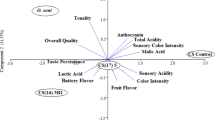Abstract.
Malolactic fermentation is the microbiological process in wines, where lactic acid bacteria (LAB) govern the process of converting L-malic acid into L-lactic acid. During this process a high microbial load of LAB may lead to an unwanted spoilage phenomena by formation of excessive amounts of undesirable flavor compounds. This study is mainly focused on the isolation of LAB from the native flora of the wine, which has an inhibitory potential against malolactic activity of LAB inherent in wines. An isolate of Leuconostoc mesenteroides subsp. cremoris was found to produce an inhibitory compound against the LAB of wines. This compound was found to be a bacteriocin-like inhibitory substance (BLIS), which has a molecular weight of 32,000 Da, and it was shown that this BLIS was effective in the control of malolactic fermentation.
Similar content being viewed by others
Author information
Authors and Affiliations
Additional information
Electronic Publication
Rights and permissions
About this article
Cite this article
Yurdugül, S., Bozoglu, F. Studies on an inhibitor produced by lactic acid bacteria of wines on the control of malolactic fermentation. Eur Food Res Technol 215, 38–41 (2002). https://doi.org/10.1007/s00217-002-0543-9
Received:
Issue Date:
DOI: https://doi.org/10.1007/s00217-002-0543-9




